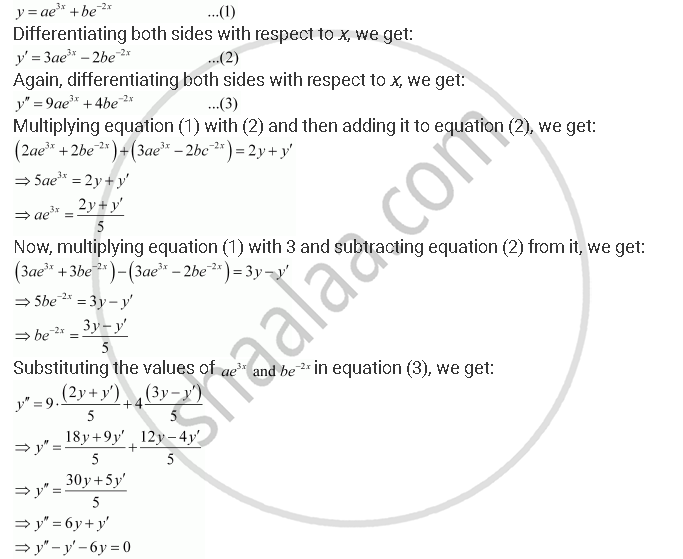Advertisements
Advertisements
प्रश्न
Form a differential equation representing the given family of curves by eliminating arbitrary constants a and b.
y = a e3x + b e– 2x
उत्तर

This is the required differential equation of the given curve.
APPEARS IN
संबंधित प्रश्न
Form a differential equation representing the given family of curves by eliminating arbitrary constants a and b.
`x/a + y/b = 1`
Form a differential equation representing the given family of curves by eliminating arbitrary constants a and b.
y2 = a (b2 – x2)
Find the particular solution of the differential equation (1 + e2x) dy + (1 + y2) ex dx = 0, given that y = 1 when x = 0.
Solve the differential equation `ye^(x/y) dx = (xe^(x/y) + y^2)dy, (y != 0)`
Find a particular solution of the differential equation (x - y) (dx + dy) = dx - dy, given that y = -1, when x = 0. (Hint: put x - y = t)
The general solution of the differential equation `(y dx - x dy)/y = 0` is ______.
The general solution of a differential equation of the type `dx/dy + P_1 x = Q_1` is ______.
The general solution of the differential equation ex dy + (y ex + 2x) dx = 0 is ______.
Find the differential equation representing the family of curves `y = ae^(bx + 5)`. where a and b are arbitrary constants.
The equation of the curve satisfying the differential equation y (x + y3) dx = x (y3 − x) dy and passing through the point (1, 1) is
Show that y = C x + 2C2 is a solution of the differential equation \[2 \left( \frac{dy}{dx} \right)^2 + x\frac{dy}{dx} - y = 0.\]
Verify that y = A cos x + sin x satisfies the differential equation \[\cos x\frac{dy}{dx} + \left( \sin x \right)y=1.\]
\[\frac{dy}{dx} = y^2 + 2y + 2\]
\[\frac{dy}{dx} = x^2 e^x\]
\[(\tan^2 x + 2\tan x + 5)\frac{dy}{dx} = 2(1+\tan x)\sec^2x\]
\[\frac{dy}{dx} = \sin^3 x \cos^2 x + x e^x\]
tan y dx + tan x dy = 0
x cos2 y dx = y cos2 x dy
cos y log (sec x + tan x) dx = cos x log (sec y + tan y) dy
cosec x (log y) dy + x2y dx = 0
A solution of the differential equation `("dy"/"dx")^2 - x "dy"/"dx" + y` = 0 is ______.
Find the general solution of the following differential equation:
`x (dy)/(dx) = y - xsin(y/x)`
The general solution of the differential equation `(dy)/(dx) + x/y` = 0 is
Solution of the equation 3 tan(θ – 15) = tan(θ + 15) is
The number of arbitrary constant in the general solution of a differential equation of fourth order are
The general solution of the differential equation `(dy)/(dx) = e^(x + y)` is
The general solution of the differential equation of the type `(dx)/(dy) + p_1y = theta_1` is
The general solution of the differential equation `(ydx - xdy)/y` = 0
The general solution of the differential equation `x^xdy + (ye^x + 2x) dx` = 0
What is the general solution of differential equation `(dy)/(dx) = sqrt(4 - y^2) (-2 < y < 2)`
Solve the differential equation: y dx + (x – y2)dy = 0
The general solution of the differential equation ydx – xdy = 0; (Given x, y > 0), is of the form
(Where 'c' is an arbitrary positive constant of integration)
